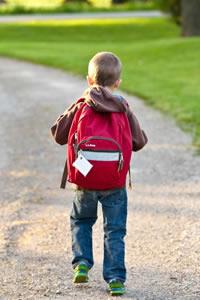Kindergarten School Day
The kindergarten day is filled with learning! Read on to see how teachers make the most of the day, or take a video tour here.
Welcome to the day – As students arrive, they are welcomed by the teacher and other staff. They unpack backpacks and participate in a morning activity, such as independent reading, journals, or math activities, while the teacher takes attendance and checks in with individual students.
Morning Meeting: Students may be singing a song, learning and practicing routines and procedures, discussing friendship, or sharing important events in their lives.
Calendar Time: During calendar time, teachers are integrating areas of math, science, reading, writing, and social studies. Teachers may choose this time to discuss the weather, days of the week, months of the year, patterns, odd and even numbers, money, place value, and temperature.
Word Work: Kindergarteners are learning how letters and words work. By the end of October, students should know letter names and sounds, and be able to identify letters in their home and community. Students practice literacy concepts such as early language skills, phonics, phonemic awareness, spelling patterns, and high frequency words.
LitFit (optional, not used in all schools): The fitness and health teacher is the lead teacher and the Kindergarten teacher participates by supporting the literacy and/or numeracy stations students during LitFit.
Literacy Centers: Students rotate through centers and practice using skills and concepts that they have learned during other reading and writing lessons. Centers may allow practice in listening, writing, sorting and classification, and reading.
Guided Reading: Small groups of students work with the teacher on targeted, specific skills during Guided Reading. Students will be reading small books at their level, increasing their vocabulary, learning reading skills and strategies, and participating in lessons appropriate to their level.
Interactive and Shared Writing: Students and the teacher are creating a written message together. In interactive writing, the students and teacher “share the pen,” while in shared writing the teacher serves as the scribe for the message. Both of these are times for teachers to help students learn about writing craft, conventions, and purpose.
Writing Workshop: During writing workshop, students take the lessons they learned during interactive and shared writing and apply them to their own work. They may be writing booklets, journal entries, stories, personal narratives, poetry, or non-fiction texts. Students will have the opportunity to revise and publish their work to share with the class and family.
Math Investigations: Students are naming numbers, counting in sequence and counting small groups of objects. They compare groups of items and numbers to determine greater and less amounts. Working with groups of objects, students are learning that addition is putting together and subtraction is taking part. They use manipulatives such as pattern blocks, unifix cubes, geoboards, Judy clocks, pattern tiles, and geoshapes.
Read Alouds: Many stories and non-fiction texts are read aloud to students throughout the day. These are key for building students' concepts about print, fluency, vocabulary, and love of reading. Fiction, non-fiction, and poetry are all used as read-alouds during different points of the day.
Science: Science is a time for discovery and exploration. Students learn about trees and the human body with a focus on systems. Teachers will create hands-on experiments and activities that inspire students to build understanding through scientific inquiry.
Social Studies: Students begin to learn the basic concepts of fairness and respect for the rights and opinions of others. They learn about community as they learn ad work together in their classroom.
Recess: As weather permits, teachers will take their students outside as much as possible. Remember to dress your child in layered, comfortable play clothes.
Lunch: Students eat lunch together in the supervised school cafeteria. Lunch is a relaxed time to fuel up for more learning and to practice conversation and manners. Students have the option of bringing their own lunch from home or eating the school’s lunch. The school lunch menu can always be found on the Spokane Public Schools website.
Physical Education: Kindergarten students work on locomotor skills such as skipping, galloping, and sliding during Fitness & Health class. They also participate in activities that increase spatial awareness, teamwork, following rules for activities and games, and beginning skills such as ball handling and proper ways to use primary fitness equipment.
Music: Kindergarteners experience, explore and discover pitch and melody, dynamics, tempo, and sound sources as they use their voices, bodies, and instruments in games and activities. They discover traditional children’s songs, nursery rhymes, folk songs, classical music, and world music. Students begin to develop singing and playing skills and techniques while exploring the elements of music.

